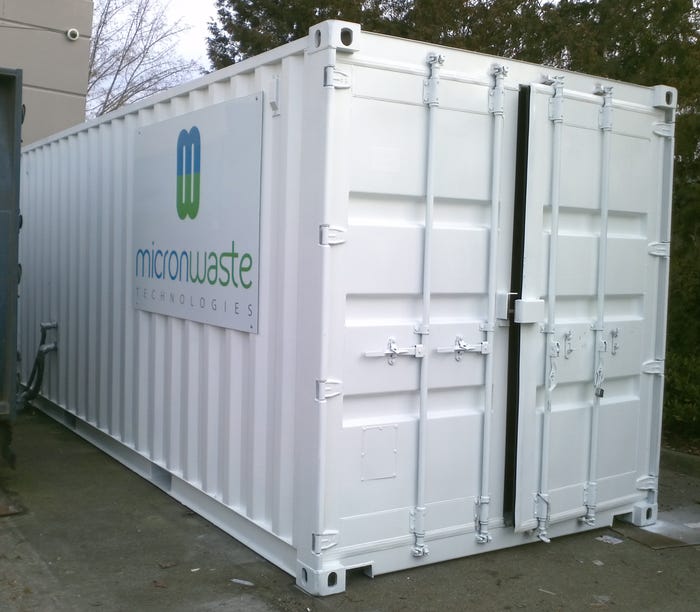Aerobic Digestion is Key to Cannabis Waste Conversion
Micron Waste Technologies Inc. and Aurora Cannabis Inc. have finalized a collaboration agreement for the treatment of organic waste generated in the cultivation and production of cannabis products.
Micron Waste Technologies Inc., a Vancouver, British Columbia-based developer of proprietary digester solutions for the treatment of organic waste, and Aurora Cannabis Inc., a Vancouver, British Columbia-based licensed producer of medical cannabis pursuant to Health Canada's Access to Cannabis for Medical Purposes Regulations, recently announced that Aurora has completed a strategic investment in Micron and that the companies have finalized a collaboration agreement for the treatment of organic waste generated in the cultivation and production of cannabis products.
“We have had prior relationships with cannabis cultivators and understood some of the problems that they were having in managing their waste,” says Bob Bhushan, founder and chief technical officer of Micron.
Micron has developed a new technology, based on aerobic digestion and subsequent treatment, which converts organic waste into clean water that meets municipal effluent discharge standards. The technology comprises of two components. The first component uses a mechanical and biological process to break down cannabis waste into sludge, which is pumped through a proprietary four-step process that utilizes naturally occurring microbes and enzymes under controlled conditions.
Through this process, components such as Biochemical Oxygen Demand (BOD), Chemical Oxygen Demand (COD), Total Suspended Solids (TSS) and Fats/Oils/Grease (FOG), as well as other components such as THC, are removed. The resulting effluent is non-potable water that meets municipal discharge standards.
“Our process breaks down the individual components, including THC, rendering the output unfit for human consumption,” says Bhushan. “The resulting effluent will meet municipal discharge standards and can be flushed down the sewer, which results in significant cost savings compared to the alternative of transporting cannabis waste.”

Micron will assemble and install an operating unit at one of Aurora’s facilities and work with the operational team to achieve the research collaboration objectives. The goal is to have a cannabis industry-optimized solution to treat cannabis waste.
“Aurora benefits from this research collaboration by being the first true major end-to-end cannabis player, by being strategically invested from the cannabis genetics, all the way to the treatment of waste from cannabis grow operations,” says Bhushan.
The primary objective is to handle cannabis waste in a manner that is operationally more efficient and cost effective than the current alternatives. The resulting water generated by Micron’s solution will meet municipal effluent discharge standards for each jurisdiction that the unit is installed at.
The secondary objective is to identify possible synergies from the Micron’s system to reuse the water and other components back into Aurora’s grow operations in a complete closed loop system.
“Micron’s technology is a very elegant solution to a time-consuming and relatively costly operation at the end of our production process,” said Terry Booth, CEO of Aurora Cannabis, in a statement. “We love the combination of the technology’s positive environmental impact with its cost effectiveness. Upon successful completion of the optimization process, we will have access to yet another innovation to improve our facilities, and we look forward to working with the Micron team to bring this very promising technology to the cannabis sector.”
Bhushan says Micron’s partnership with Aurora highlights the cost benefits of a decentralized organic waste treatment solution.
“One of the key issues facing the waste industry is cost,” he says. “Significant capital costs are incurred when building centralized processing facilities, but because of direct and indirect issues associated with smell, these facilities are often placed far away from city centers. This means that the cost of logistics in transporting organic waste is higher.”
Booth said in a statement that in making this investment, Aurora anticipates benefiting not only from the positive impact on the company’s operations, but also by being exposed to the upside potential of Micron’s commercial development.
“The investment in and collaboration with Micron reflect our commitment to innovation in the cannabis sector, aimed in this case at achieving improved operational economics, as well as a superior, ‘greener’ approach to organic waste management,” he said in a statement.
About the Author
You May Also Like


.png?width=300&auto=webp&quality=80&disable=upscale)